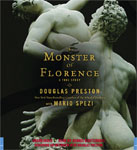
 The Monster Of Florence: A True Story
The Monster Of Florence: A True Story
By Douglas Preston and Mario Spezi; Read by Dennis Boutsikaris
8 CDs – Approx. 9.5 Hours [UNABRIDGED]
Publisher: Hachette Audio
Published: 2008
ISBN: 9781600242090
Themes: / Crime / History / Mystery / Murder / Serial Killer / Conspiracy / Italy / Florence / Sardinia / The Renaissance /
In 2000, Douglas Preston and his family moved to Florence, Italy, fulfilling a long-held dream. They put their children in Italian schools and settled into a 14th century farmhouse in the green hills of Florence, where they devoted themselves to living la dolce vita while Preston wrote his best-selling suspense novels. All that changes when he discovers that the lovely olive grove in front of their house had been the scene of the most infamous double-murders in Italian history, committed by a serial killer known only as the Monster of Florence.
If you’re a fan of Douglas Preston’s fiction you’ll be all into digging the biographical details he adds to this illuminating non-fiction account of a real monster and the labyrinthine twists and turns the investigation took. Those readers looking for insight into Thomas Harris’ Hannibal novels can find this story impactful too. Myself, I was most interested in the unparalleled access this fearsome story details, namely the historical forces that shaped Florence, Tuscany and Sardinia from ancient days, through the Renaissance, the 1960s, 1970s, and on up to the present. Preston, with help from Spezi, provides elucidating details about how the killer (or killers) got away with 16 murders that took place between 1968 and 1985. Their book, this audiobook, is an indictment of Florentine and Italian journalists, the Italian national police , the Florentine investigators, and one prosecutor in particular. In short, after more than 30 years of criminal investigation the case remains an unsolved mystery. Spezi and Preston do take a guess at the culprit, and they back that guess up with a logic chain that is a helluva-lot-more compelling than the official explanation. But, just thinking about it all, a week or two later, I’m still shaking my head. The final disgrace of this story came as a result of a convergence between the Public Minister of Perugia, Giuliano Mignini, and a fraud psychic named Gabriella Carlizzi. Together they explained to themselves, and the arresting police, that Mario Spezi was actually involved in the murders and was a member of a satanic cult.
Even more worrisome, if it is possible to imagine, is what Preston argues is a fairly widespread Italian cultural embrace of something called “dietrologia.” Literally meaning “behindology,” dietrologia is the practice of assuming that nothing notable is as it actually appears – that something hidden (often sinister, cynical and/or conspiratorial) is behind any and all notable events. In Canada we might call it acting paranoid, or being a conspiracy theorist. In Italy, apparently, it is regularly practiced around the dinner table. And it’s all fun and games, I guess, until you end up throwing innocent people in jail. During the writing of The Monster Of Florence Spezi was arrested for either being a collaborator with the Monster or actually being the serial killer himself. Meanwhile Douglas Preston was interrogated, told to confess, threatened with arrest, and forced to leave Italy upon pain of prosecution. The Monster Of Florence case was completely bungled. This was a clusterfuck on par with the notorious California’s McMartin preschool investigation and trial. I guess it all goes to show that police and prosecutorial incompetence is alive and well in the new and old worlds both.
Reader Dennis Boutskaris takes full control of the narrative, becoming the voice of Preston (and Spezi) for the entire audiobook. To my untrained ears his Italian accent sounded fine. The cover art, as mentioned in the audiobook, comes from a photograph of a statue in Piazza della Signoria, in Florence (The Rape of the Sabine Women by Giambologna |JPG|). In addition, on the final disc, there is an informative interview with Douglas Preston.
Posted by Jesse Willis



